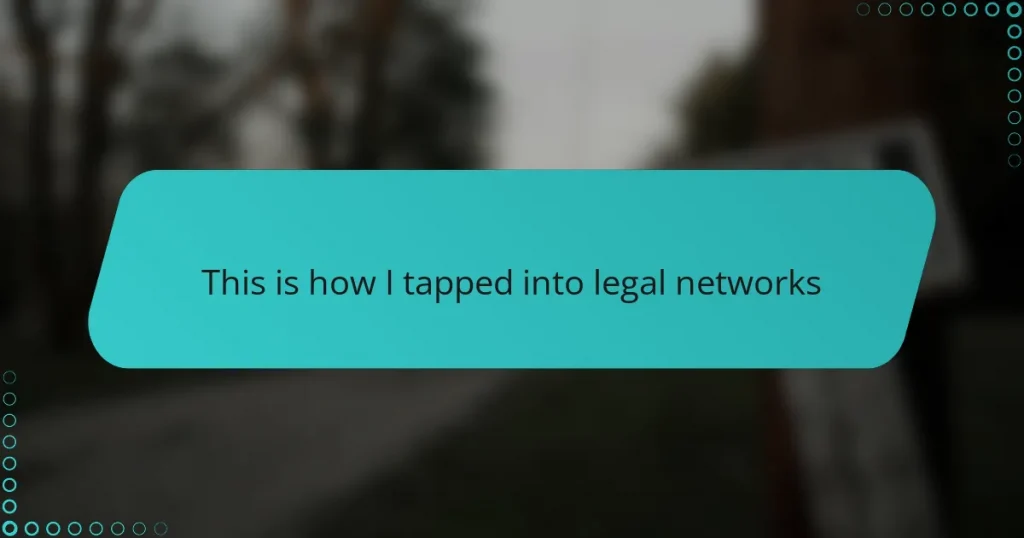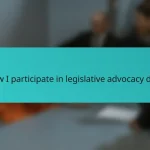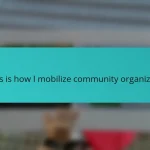Key takeaways
- Legal advocacy networks act as multipliers of influence, connecting advocates and facilitating resource-sharing for greater societal impact.
- Active participation and genuine relationships within these networks enhance knowledge, skills, and mutual support, fostering a sense of community.
- Attending events and leveraging existing relationships can help individuals discover valuable networks that align with their advocacy interests.
- Sharing personal successes promotes collaboration and inspires others, strengthening bonds within the network and encouraging collective motivation.
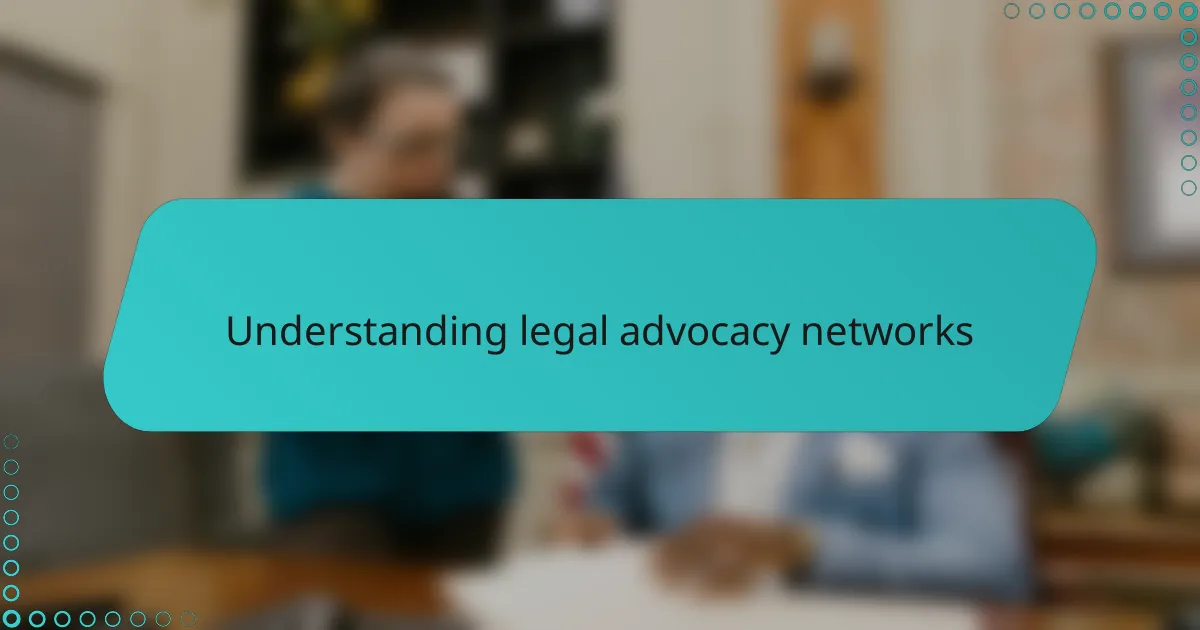
Understanding Legal Advocacy Networks
Legal advocacy networks are more than just groups of professionals; they are vibrant communities united by a shared passion for justice. When I first explored these networks, I realized how crucial it is to understand their structure and goals to truly benefit from them. Have you ever wondered how such networks manage to amplify individual efforts into significant societal change?
From my experience, these networks function as multipliers of influence. They connect advocates, lawyers, and activists, creating channels for collaboration and resource-sharing. It felt empowering to see that by plugging into the right network, my own efforts didn’t just stay local—they contributed to a much larger movement.
What struck me most was the dynamic nature of these networks. They constantly evolve, adapting to new legal challenges and emerging social issues. Understanding this fluidity helped me stay engaged and proactive rather than overwhelmed, turning a complex landscape into a navigable path.
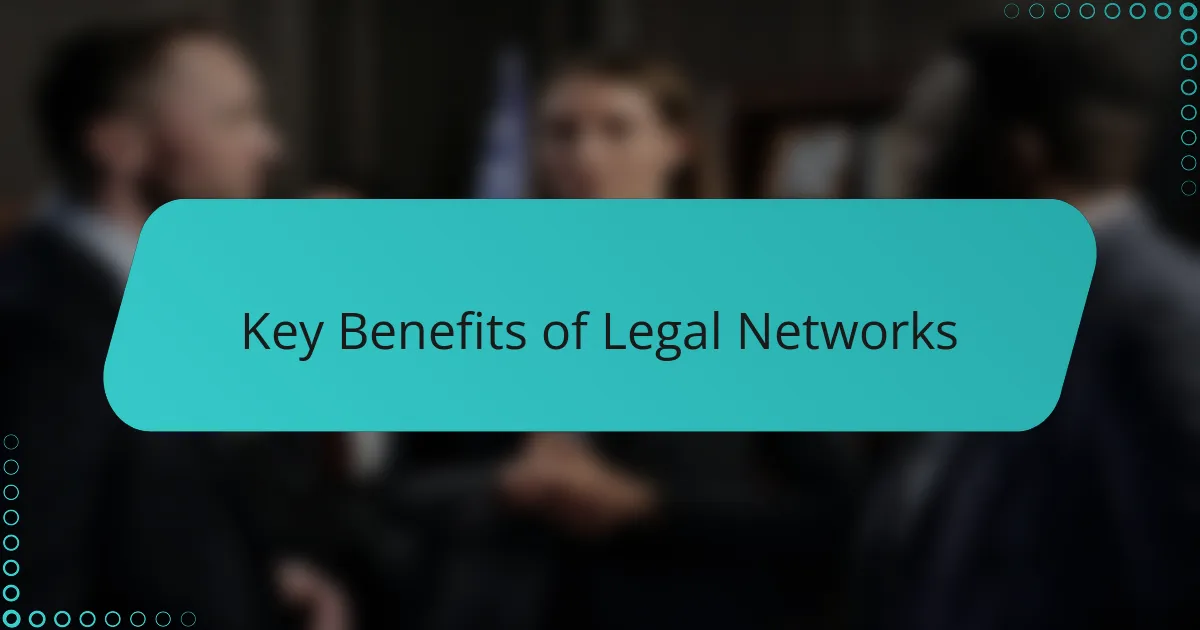
Key Benefits of Legal Networks
One of the biggest benefits I discovered in legal networks is the power of collective knowledge. When you’re part of a group where everyone shares insights and strategies, it’s like having a constant source of inspiration and solutions at your fingertips. Have you ever faced a tough legal challenge and wished you had someone to brainstorm with? That’s exactly what these networks offer.
Another aspect that really resonated with me was the access to diverse expertise. Legal networks bring together people from various backgrounds and specialties, which broadens your perspective and sharpens your advocacy skills. I found myself learning things I never expected, simply by engaging in conversations within the network.
Lastly, there’s an undeniable sense of support and encouragement that comes with being part of a community fighting for justice. It can be emotionally draining to face legal battles alone, but having a network means you’re never truly isolated. That feeling of solidarity kept me motivated during the toughest moments, reminding me that my voice mattered in a bigger movement.
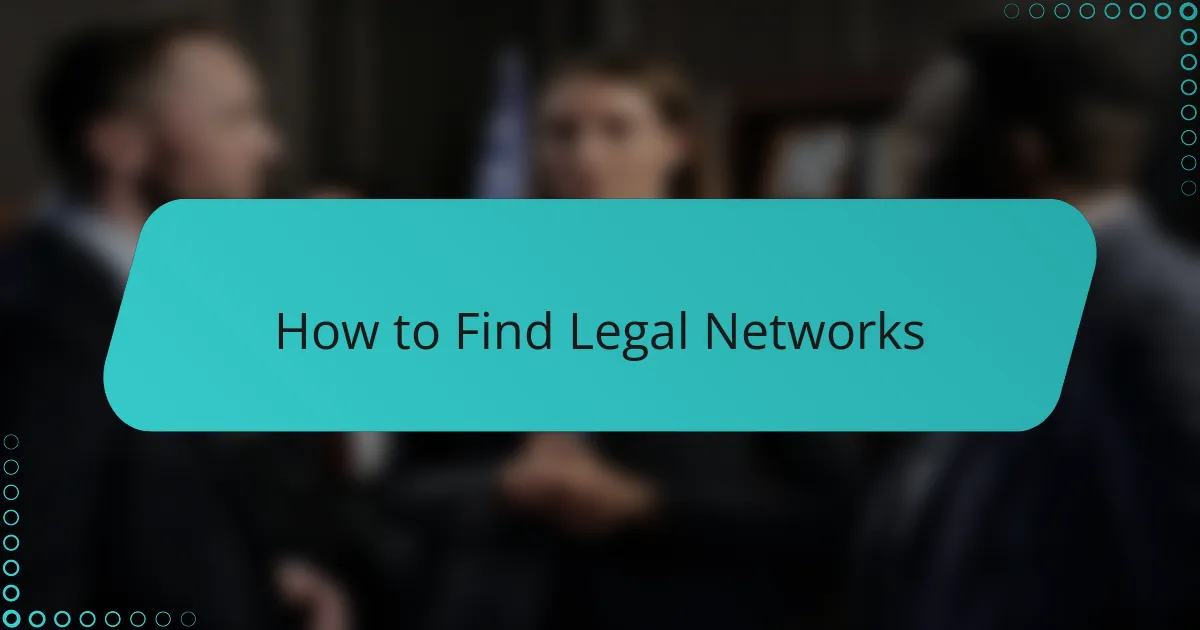
How to Find Legal Networks
Finding legal networks started for me with a simple online search, but I quickly learned that not all networks are created equal. Have you tried typing “legal advocacy groups” into Google and felt overwhelmed by the options? I did, and it wasn’t until I explored specialized directories and professional platforms like LinkedIn that I found communities aligned with my interests.
Another approach that truly opened doors was attending local law forums and advocacy events. I remember walking into a community meeting unsure and somewhat hesitant, but by engaging with attendees and asking questions, I discovered networks that weren’t visible online. Sometimes, real connections come from showing up in person and sharing your passion face-to-face.
I also found that reaching out to mentors and colleagues was invaluable. Asking someone in my circle if they knew of active legal networks led me to invitations I never expected. It made me realize that tapping into existing relationships can be just as important as searching afresh—have you ever been surprised by how much a simple introduction can expand your reach?
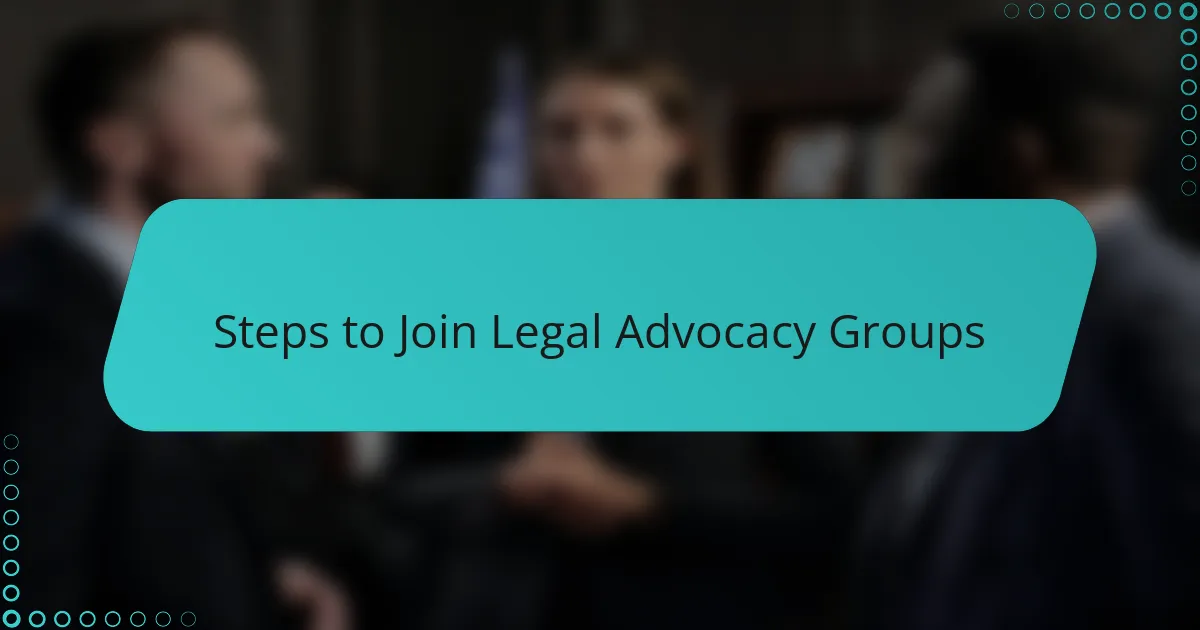
Steps to Join Legal Advocacy Groups
Taking the first step to join a legal advocacy group can feel daunting, but I found that simply expressing genuine interest opened many doors. Have you ever reached out to a group and been welcomed just because you showed up ready to learn? That eagerness often makes a stronger impression than you might expect.
Once I made contact, I focused on attending meetings and participating actively—I quickly realized that involvement is key. Did you know that most groups encourage new members to contribute from the start, whether by volunteering or sharing ideas? Engaging early helped me feel like part of the community and built trust among seasoned advocates.
Finally, I made it a point to follow up and nurture connections beyond initial meetings. Building relationships over time transformed casual introductions into mentorships and collaborations. My advice: treat joining a legal advocacy group as the beginning of a dynamic journey, not just a one-time signup. Have you ever noticed how those ongoing relationships often become your greatest resource?
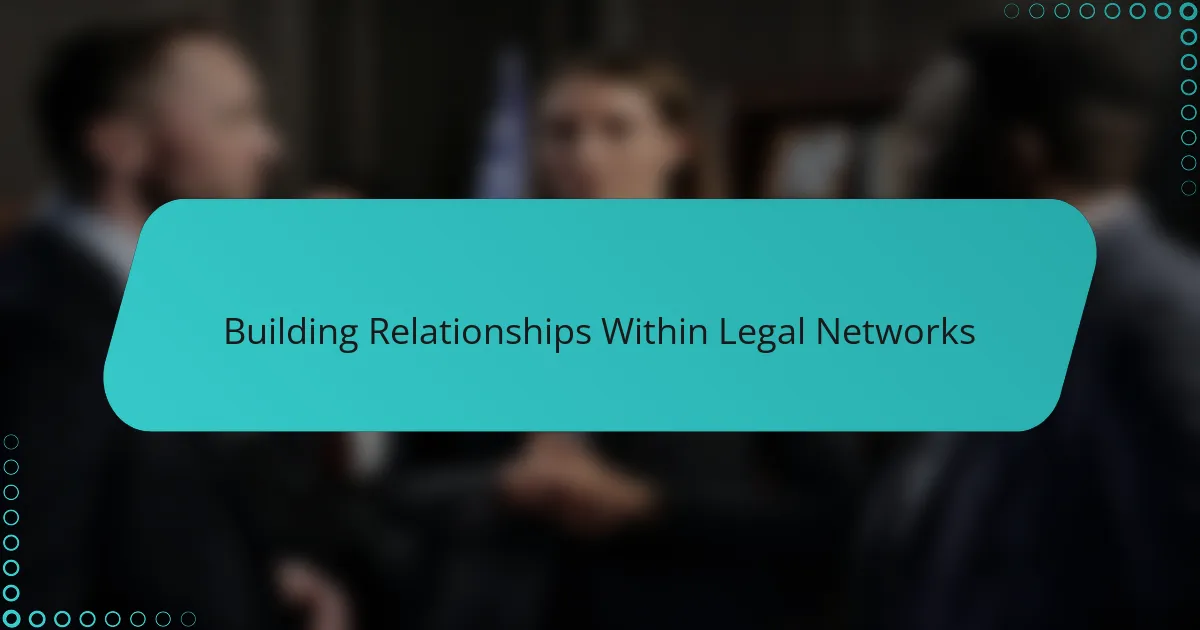
Building Relationships Within Legal Networks
When I first started reaching out within legal networks, I discovered that building relationships is much more about genuine connection than exchanging business cards. Have you ever felt hesitant to approach someone because you weren’t sure what to say? I found that simply showing authentic interest in others’ work opened doors and started meaningful conversations.
One thing I learned quickly is that trust doesn’t develop overnight. By consistently participating in discussions and offering help without expecting immediate returns, I found my relationships deepening naturally. It became clear to me that patience and reliability are the currency of these networks.
What surprised me most was how vulnerability played a role in building these bonds. Sharing challenges or asking for advice made me more approachable and invited others to do the same. It’s a powerful reminder: in legal advocacy, relationships thrive when we are both confident and authentic.
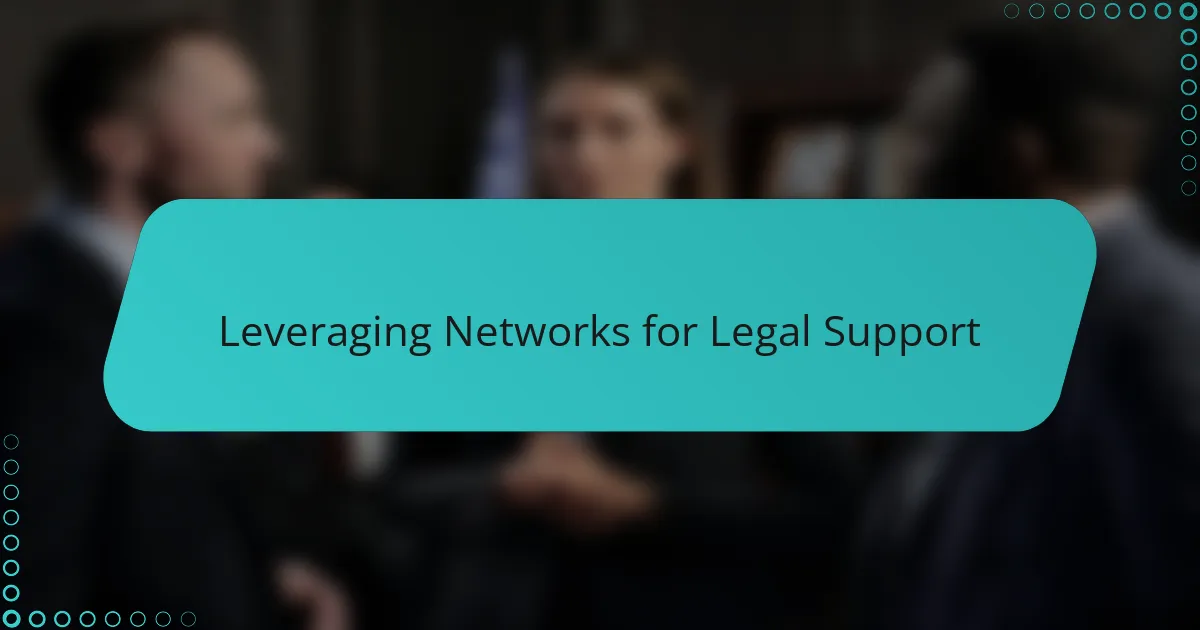
Leveraging Networks for Legal Support
Leveraging networks for legal support transformed my approach to advocacy. Instead of feeling isolated, I tapped into a web of professionals whose collective expertise became my safety net. Have you ever experienced the relief of knowing someone in your network has faced your exact legal challenge and can guide you through it? That connection is invaluable.
I quickly realized that leveraging these networks isn’t just about asking for help—it’s about contributing meaningfully in return. When I shared my own resources and insights, doors opened wider, and trust grew organically. It made me appreciate that strong legal networks function like a two-way street, where mutual support fuels sustained impact.
What truly struck me was how these networks provide access to specialized knowledge that I could never have acquired alone. Joining focused working groups and tapping into mentorship opportunities brought clarity and confidence during complex cases. Isn’t it empowering to know that you have a whole team behind you, ready to brainstorm solutions when the stakes are high?
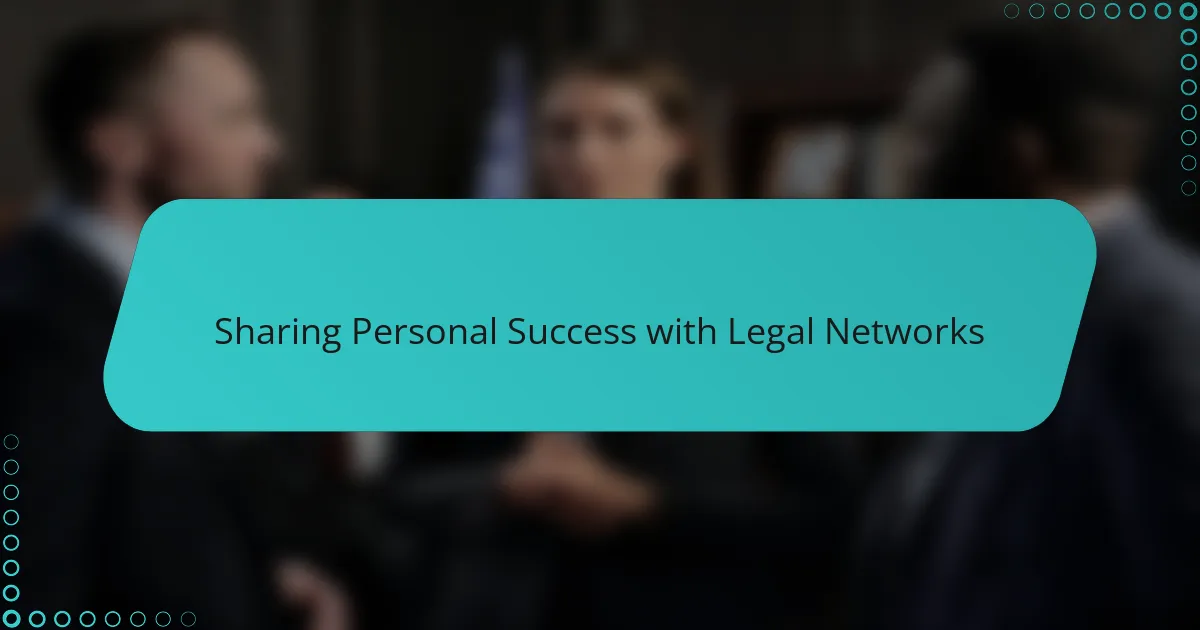
Sharing Personal Success with Legal Networks
Sharing my personal successes within legal networks has been surprisingly rewarding. I recall a time when I presented a case outcome that I thought was just a small win, only to find that it sparked insightful discussions and inspired others facing similar challenges. Have you noticed how sharing your story can turn a singular experience into collective motivation?
Sometimes, opening up about success feels vulnerable, but I learned it actually builds credibility and deepens connections. When I shared both my victories and the lessons from setbacks, it invited feedback and collaboration that enriched my approach. Isn’t it amazing how authenticity invites trust and opens doors within these networks?
One moment stands out—after posting about a successful advocacy campaign, several members reached out with congratulations and offers to partner on future initiatives. That instant sense of community made me realize how sharing success creates momentum, not just for me but for everyone involved. Have you experienced the power of celebrating wins together?
